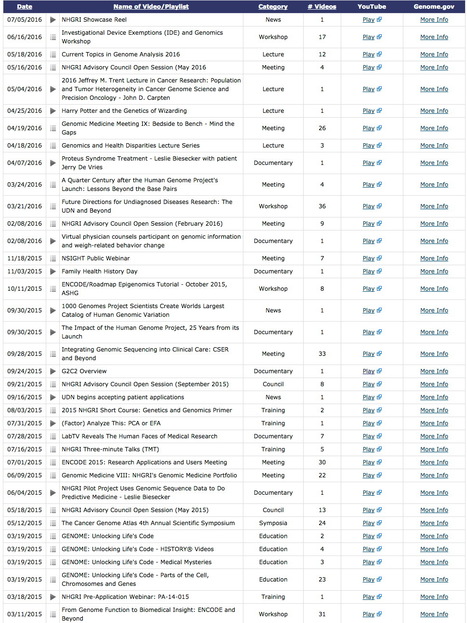A full listing of videos featuring the science, research, programs and staff of the National Human Genome Research Institute, as well as researchers and scientists from around the world.
Many of these videos were created and produced by Genome Productions, a part of the Communications and Public Liaison Branch of the National Human Genome Research Institute. All government-produced video and audio clips are in the public domain and may be freely distributed and copied, but, as a courtesy, it is requested that the National Human Genome Research Institute be given an appropriate acknowledgement: Courtesy: National Human Genome Research Institute.
Research and publish the best content.
Get Started for FREE
Sign up with Facebook Sign up with X
I don't have a Facebook or a X account
Already have an account: Login
Amazing science facts - 3D_printing • aging • AI • anthropology • art • astronomy • bigdata • bioinformatics • biology • biotech • chemistry • computers • cosmology • education • environment • evolution • future • genetics • genomics • geosciences • green_energy • language • map • material_science • math • med • medicine • microscopy • nanotech • neuroscience • paleontology • photography • photonics • physics • postings • robotics • science • technology • video
Curated by
Dr. Stefan Gruenwald
 Your new post is loading... Your new post is loading...

davidgibson's curator insight,
May 28, 2013 11:05 PM
This 36 min video is well worth the time spent - to get an idea (hopefully a transferrable one) about Big Data and the frontiers of science. In this case both "wet lab" (test tubes microscopes) and "dry lab" (computer modeling with machine learning) and needed and so is content as well as computational literacy. |

Miro Svetlik's comment,
May 23, 2013 3:00 AM
Hello Ahmed, I certainly believe you and I am really curious how it will change our society.

Ahmed Atef's comment,
August 15, 2013 8:51 AM
Hello Miro for now you can decode any genome for just two days assembling any genome is the only limitation because the price if you can make dna printer like this that mean during one year your backyard will be filled bye home designed organisms
|











